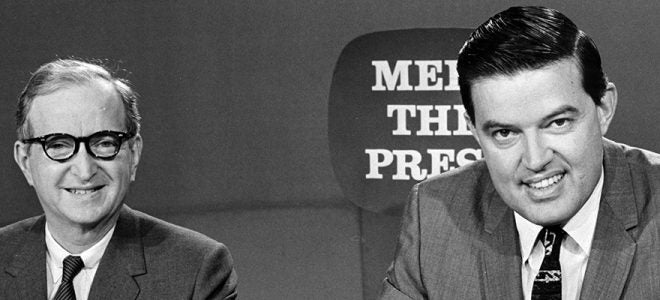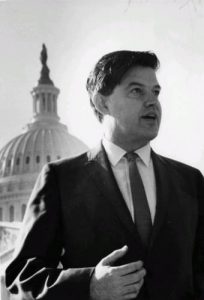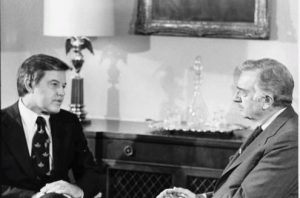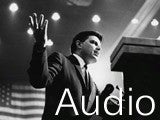

Dr. Julie Lane is an assistant professor in the Department of Communication at Boise State University, where she teaches courses in media studies and public relations. She is a media historian, and her research focuses on how the news media helped shape political narratives during the mid-20th century.
In late 1963, when the Johnson administration hinted at an expansion of the American military presence in Vietnam, Idaho Senator Frank Church made a bold decision. The second-term Democratic senator and member of the Senate Foreign Relations Committee believed the war revealed fundamental problems with U.S. postwar foreign policy, and he called for a reassessment of its basic assumptions. This represented a challenge to leaders of his own party – including the president – who had helped shape that policy; and it was a risky move for a senator from a conservative state, given Republican advocacy for more forceful action in Vietnam. The senator believed, however, that it was his duty to help the nation correct its course. He also deemed it critical to involve the American public in the debate, and in the 1960s that required outreach to the news media.
The response of the media to the Vietnam War has been the subject of much debate. Critics on the right have claimed that highly critical coverage “lost” the war by turning the American public against it, while observers on the left have asserted that the media consistently acted as independent critics. Historians have offered a different perspective, arguing that the media, which had helped shape an anti-communist Cold War ideology, accepted justifications for the U.S. commitment to South Vietnam; that coverage largely reflected administration statements about the war’s progress – at least until January 1968 when the Tet Offensive prompted more congressional critics to come forth, allowing news reports to reflect this dissension. As this narrative suggests, however, journalists rely on the availability of official sources willing to go on the record with their criticism. Throughout 1964-1965, as the U.S. military presence in Vietnam expanded, few such sources existed. The most vocal were Senators Wayne Morse of Oregon and Ernest Gruening of Alaska, but their zealous demands for withdrawal stood little chance of influencing the administration. Church, on the other hand, wanted to gain media coverage of his foreign-policy critique while preserving both his relationship with President Lyndon Johnson and his reputation for moderation. Therefore, he took a different approach. In so doing, he proved useful to the media, who could incorporate his less-adversarial yet consistent criticism into coverage and help to legitimize dissent.

When Church offered a resolution in September 1963 to reduce aid to South Vietnam if the Diem regime did not end its brutal treatment of Buddhist monks, he drew the attention of the influential New York Times. Although a September 13 Times editorial expressed fear that such a move would prove disastrous, former Washington bureau chief Arthur Krock praised the resolution on September 17 for opening a much-needed “way to a thorough appraisal” of U.S. policy and for encouraging Congress to fulfill its “constitutional right and duty of thorough inquiry.”
After Johnson succeeded President John Kennedy in November and signaled his plans for an expansion of the U.S. military mission, Church worked more deliberately to get his message out. In March 1964 he gave an interview to the Washington Sunday Star in which he asserted that U.S. policy toward Vietnam ignored the legacy of colonialism in Southeast Asia. Americanizing the war would force the nation to “seize and hold” the area “with naked American power,” which the Vietnamese would see as imperialism, he said, adding that “the last 20 years demonstrates the folly of such a course.” Rather than deepening U.S. involvement, he argued it was time for “a reappraisal of fundamental propositions that long have frozen American policy into place, both in Europe and in the Pacific.”
Although the interview did not generate additional press coverage, Church’s ideas still drew attention. A summary of congressional statements prepared for the State Department on March 16 noted the interview at length, and the Times appeared open to addressing the issues he raised. On March 29, the newspaper gave prominent coverage to a speech by Senator William Fulbright, chairman of the Foreign Relations Committee, that exposed the “myths” underlying U.S. foreign policy. Then, on April 12, correspondent Max Frankel wrote that “[t]he hour seemed right….the people seemed ready….even the Administration seemed responsive…. but so far there has been no great debate.” Letters also trickled in to Church’s office from states beyond Idaho. Church, however, remained cautious. Fulbright was reticent to question the administration, and senators of both parties rallied around the president following the Gulf of Tonkin incident in August 1964.
Church was right to be wary given the Times’ treatment of Morse. Typically coverage simply labeled Morse the administration’s most “persistent critic,” but often it emphasized his colorful language and depicted him as antagonistic and outside the Senate mainstream. An August 8, 1964 profile said his colleagues respected him for offering substantial arguments but found “almost intolerable…the self-righteous conviction with which he pursues his goals.” Times writers also called him “sharply critical,” said he pressed for “radical change,” portrayed him as “mocking the President,” described him as “extremely bitter” during the Gulf of Tonkin debate, and dismissed his and Gruening’s opposition to the resolution, claiming there was “no support” for their rationale.

As Church’s discomfort with administration policy grew, he again turned to the press talking to an outlet that provided him extensive and exclusive space to present his position. In an interview with Ramparts, a magazine for Catholic lay people, Church repeated his concerns about U.S. foreign-policy and called for “a major shift on Asia.” He said the United States should honor its commitment to help Saigon but argued if American troops began to fight, “the Asian peoples involved…will come at once to regard the war as one between a white western force on the one hand, and indigenous Asian forces on the others.” It was time, he said, to prepare the public “to support a flexible foreign policy tailored to serve the real interest of the United States in a changing world.”
Ramparts had a limited audience, but Church’s call for a change in — rather than simply an assessment of — U.S. Cold War policy prompted major news outlets to reach out to him following publication of the interview in December. He used more explicit and forceful language than he had previously, earning recognition as a prominent critic. However, he continued to distinguish himself from Morse and Greuning by calling for negotiations rather than withdrawal, and he avoided directly attacking Johnson’s policy. The senator issued a statement at the request of national television networks, and the Times featured his interview in a front-page article. A Times editorial called Church a “thoughtful voice” who “said publicly what many United States officials are saying privately about Vietnam,” and the newspaper invited him to write a piece for the Sunday Magazine. In his February 14 essay, Church concluded “the question isn’t really whether we should negotiate, but when.”
Throughout the remainder of 1965 Church worked to expand the reach of his message. In speeches in Detroit; Palo Alto, California; and Sun Valley, Idaho; and on the Senate floor; during an appearance on ABC, and in contributions to the Saturday Evening Post and the Times, Church repeated his warnings and his call for a negotiated settlement. He contacted journalists, while his staff issued summaries of his speeches to wire services and to the Times and the Washington Post.

Trying to keep Johnson’s favor, Church was careful to criticize the totality of U.S. postwar foreign policy and to praise the president; nevertheless, he also began speaking out about the responsibility of Americans to dissent and the need for those in power to lead the way. Privately, he had encouraged Fulbright to open the usually closed-door Foreign Relations Committee meetings, and he told attendees at an Economic Club of Detroit event on February 22, “I think it is incumbent upon all of us who hold public trust to open a discussion of the alternatives, so that the American people, who will be asked to fight the war, will have some knowledge of what is basically involved.” In a June 24 statement he defended antiwar protestors, saying “[o]nly dictatorships stifle dissent,” and he asserted that for the Senate “[t]o remain silent, when the prospect of a widening war confronts us, would be to shirk our duty; worse still, it would be to behave like a mock parliament of a totalitarian state.”
The results of Church’s outreach efforts were subtle. Although the Times did not take up his call for an examination of the premises of U.S. foreign policy, Church helped to legitimize debate over the war. A May 9, 1965, editorial bemoaned the “erosion of Congress’s authority” regarding foreign policy and “an atrophy of democratic debate.” Shortly thereafter, a June 6 article by E.W. Kenworthy favorably contrasted the “almost daily Jeremiads of Senators Wayne Morse and Ernest Greuning” and the “occasionally considered and temperate criticisms of Senators Frank Church and George McGovern” with the silence of their colleagues who “appear[ed] to be yielding to a ‘forced convergence’ with official views.” By early 1966, as Fulbright edged toward opening hearings to allow the public to hear the testimony of administration officials, Times journalists encouraged such action. James Reston, for example, complained in a January 21 column that “[n]o capital ever talked so much about ‘great debates’ or had so few of them. The Senate has not been performing its constitutional function of ‘advise and consent’ on the critical issues of foreign affairs,” and a January 25 profile of Fulbright called him a “rebel with a cause” while praising his defense of an active foreign-policy role for the Senate. When Fulbright commenced public hearings in February 1966, he became a focal point of Times coverage. Throughout the crucial year of 1965, however, as the Times seemed to wait for Fulbright to emerge as a leader of the opposition, Church had provided the Times a “temperate” critic of the war. Rarely do mainstream news outlets lead criticism of policy; rather, they look for officials willing to go on the record with their criticism, and Church performed that duty.
Transcript of 1969 Ad Campaign
[Narrator] Reproduced from the Boise State University Library, Special Collections and Archives.
[Church] A popular government cannot remain indifferent to the rising opposition of the people to our continued participation in this war. In the past two national elections, the people voted for peace yet, all they got was more war. The reluctance of the government to heed public opinion is the underlying cause for the massive outpouring of pent-up feeling that occurred on October 15th, Moratorium Day. Now that the president has commenced to withdraw from Vietnam, the people would like to see the process speeded up. At the present rate of withdrawal, American troops will be engaged in Vietnam for the next eight to ten years. The present policy, dependent as it is on moves of Saigon or Hanoi, waits upon the pleasure of foreign governments who was interests differ diametrically from ours. We should keep the timetable in our own hands where it belongs.
[Narrator] This material may be protected by copyright law, Title 17 US code.